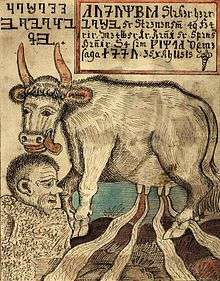Búri

Búri (or Buri) was the first god in Norse mythology. He is the father of Borr and grandfather of Odin, Vili and Ve. He was formed by the cow Auðumbla licking the salty ice of Ginnungagap during the time of Ymir. The only extant source of this myth is Snorri Sturluson's Prose Edda.
|
Hon sleikti hrímsteinana er saltir váru. Ok hinn fyrsta <dag> er hon sleikti steina, kom ór steininum at kveldi manns hár, annan dag manns höfuð, þriðja dag var þar allr maðr. Sá er nefndr Búri. Hann var fagr álitum, mikill ok máttugr. Hann gat son þann er Borr hét. [1] |
She licked the ice-blocks, which were salty; and the first day that she licked the blocks, there came forth from the blocks in the evening a man's hair; the second day, a man's head; the third day the whole man was there. He is named Búri: he was fair of feature, great and mighty. He begat a son called Borr[.] – Brodeur's translation |
Búri is mentioned nowhere in the Poetic Edda and only once in the skaldic corpus. In Skáldskaparmál Snorri Sturluson quotes the following verse by the 12th century skald Þórvaldr blönduskáld.
|
Nú hefk mart |
|
Búri's name

The length of the u in the name is not explicitly marked in the manuscripts but it is traditionally assumed to be long because of its metrical position in Þórvaldr's stanza. However, the metrical structure of fornyrðislag is hardly strict enough for definite conclusions to be reached from a single occurrence - especially when the imperfect oral and manuscript traditions are taken into account. It is thus entirely possible that the original form was Buri.
The meaning of either Búri or Buri is not known. The first could be related to búr meaning "storage room" and the second could be related to burr meaning "son". "Buri" may mean "producer".
In any case the form Buri is often used in an ASCII context or as an anglicization of Búri. In the mainland Scandinavian languages Bure is used as a familiar form.
References
| Wikimedia Commons has media related to Búri. |
- Ásgeir Blöndal Magnússon (1989). Íslensk orðsifjabók. Reykjavík: Orðabók Háskólans.
- Brodeur, Arthur Gilchrist (transl.) (1916). The Prose Edda by Snorri Sturluson. New York: The American-Scandinavian Foundation. Available online at Google Books.
- Eysteinn Björnsson (ed.) (2005). Snorra-Edda: Formáli & Gylfaginning : Textar fjögurra meginhandrita. http://www.hi.is/~eybjorn/gg/
- Faulkes, Anthony (transl.) (1987). Edda. London: J. M. Dent. ISBN 0-460-87616-3.
- Finnur Jónsson (1931). Lexicon Poeticum. København: S. L. Møllers Bogtrykkeri.
- Finnur Jónsson (1912–15). Den norsk-islandske skjaldedigtning. København: Den arnamagnæanske kommission. Edition of Þórvaldr's fragments available at http://www.hi.is/~eybjorn/ugm/skindex/tblond.html.